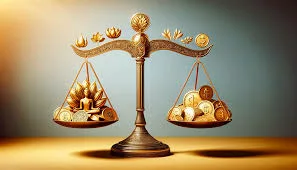Corruption remains a formidable challenge in Nigeria, casting a long shadow over the nation’s progress and undermining its reputation. However, amidst the pervasive grip of this insidious vice, there is an ongoing battle for integrity, justice, and prosperity. Nigeria’s fight against corruption is far from over, but with concerted efforts and unwavering determination, there is hope for a brighter future.
Corruption has entrenched itself deeply within Nigerian society, manifesting in various forms across all sectors. From petty bribery to grand-scale financial fraud, its impacts are far-reaching, eroding public trust, undermining institutions, and impeding socio-economic development. Tackling corruption is not just a moral imperative; it is essential for Nigeria’s growth and stability.
The economic toll of corruption is staggering. Billions of naira meant for critical infrastructure, healthcare, education, and social welfare are diverted into the pockets of corrupt individuals, perpetuating poverty, inequality, and hindering economic progress. Addressing corruption is therefore paramount for fostering inclusive growth and prosperity.
Over the years, Nigeria has implemented various anti-corruption measures, including the establishment of institutions like the Economic and Financial Crimes Commission (EFCC) and the Independent Corrupt Practices and Other Related Offenses Commission (ICPC). While these efforts have yielded some successes, the battle against corruption is an ongoing struggle that requires sustained commitment and vigilance.
Central to Nigeria’s anti-corruption efforts is the active participation of its citizens. Every Nigerian has a role to play in combating corruption by upholding integrity, refusing to engage in corrupt practices, and reporting wrongdoing when witnessed. Whistleblowers, in particular, play a crucial role in exposing corruption and recovering stolen assets, highlighting the power of individual action in the fight against corruption.
Structural reforms are also essential for combating corruption effectively. Strengthening institutions, ensuring the independence of the judiciary, and promoting government transparency and accountability are critical steps towards creating an environment where corruption is less tolerated and more difficult to perpetrate.
Furthermore, collaboration with the international community is vital in the fight against corruption. Nigeria must seek cooperation in repatriating stolen assets and prosecuting corrupt individuals who have fled abroad. Global partnerships can bolster Nigeria’s anti-corruption efforts and send a strong message that corruption will not be tolerated, both domestically and internationally.
The battle against corruption is a long-term endeavor that requires sustained commitment and collective action. While progress may be gradual, every step taken toward rooting out corruption brings Nigeria closer to realizing its full potential as a just, prosperous, and respected nation.
As Nigeria continues its journey towards a corruption-free society, it is crucial for all stakeholders—citizens, government, institutions, and the international community—to remain steadfast in their resolve. By working together with determination and integrity, Nigeria can overcome the scourge of corruption and build a brighter future for generations to come.





